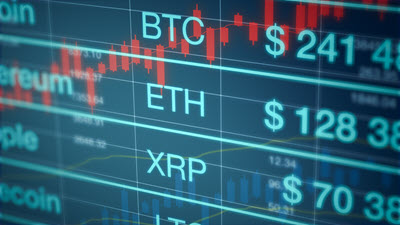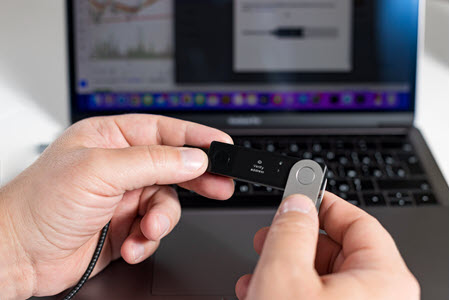How to buy and sell cryptoassets
There are many different ways to buy and sell cryptoassets.
Over-the-counter (OTC) market
In an OTC market, cryptoassets can be exchanged between people. OTC markets offer users a degree of payment flexibility, with sellers being able to choose how they wish to be paid. However, OTC markets are unregulated.

Initial cryptoasset or token offerings
An initial cryptoasset or token offering, commonly called an ICO (initial coin offering), is a means of raising capital through the Internet, usually for the purpose of financing a technological project in the start-up stage of development. Investors are offered cryptoassets, or tokens, whose potential value and use are closely tied to the financed project’s success.
Watch the video to learn about ICOs and find out more about volatility and fraud risks.
Cryptoasset Exchange-Traded Funds (ETFs)
This type of ETF is designed to replicate the performance of a cryptoasset. The investors’ money is invested in cryptoassets or derivatives whose underlying asset is a cryptoasset. Like cryptoasset prices, the value of these ETFs can fluctuate significantly. Investing in these ETFs is very risky. There are no guarantees, and you could lose your investment.
Read the ETF fund facts document carefully before investing and make sure you invest according to your investor profile.
Blockchain funds
Blockchain funds are similar to other funds that invest in a particular industry or sector of the economy. In this case, blockchain funds invest in companies that have operations related to blockchain technology.
Tax consequences
Using cryptoassets will have tax consequences for you if you:
- use them to acquire goods or services;
- convert them to monetary currency;
- exchange them for another virtual currency;
- sell them or use them to make a donation.
For more information, see the section of the Revenu Québec website You have to report your cryptocurrency transactions This link will open in a new window.
Cryptoasset trading platforms
You can buy and sell crypto on a number of on-line trading platforms.
However, many on-line trading platforms are not registered with the AMF. These platforms may have deficiencies related to the secure management of client funds, custody of assets, the protection of personal information (privacy) and measures to prevent market manipulation. The platforms and their principals may be located outside Canada, making it difficult to sue them and withdraw your money and cryptoassets.
While its application for registration is being reviewed, a platform must file a pre-registration undertaking with the AMF in order to continue to operate in Québec. This undertaking provides that the platform agrees to comply with terms and conditions that are intended to protect investors and generally consistent with current requirements for registered platforms. Once registered, a platform is subject to random inspections of its activities by the AMF or another Canadian securities regulator, ensuring that the platform complies with the applicable legal and regulatory requirements. Platforms that are not registered and that solicit clients in Québec are not subject to such oversight. These platforms could be in breach of their regulatory obligations.
Lastly, a platform’s filing of a pre-registration undertaking or registration as a dealer does not eliminate the risks related to cryptoassets, including volatility or liquidity risk. While you can make a profit, you can also lose a lot of money. You should consider your risk tolerance and ability to withstand losses before investing.
![[Translate to English:] Représentation d'une plateforme de négociation de cryptos](/fileadmin/lautorite/medias/images/grand-public/investissements/cryptos-plateforme.jpeg)
Platforms registered with the AMF
A list of cryptoasset trading platforms is also available in the Registers section of the AMF website.
Be vigilant
Before investing through a platform, check the warning list of websites and companies
Opening an account
Before allowing you to open an account, a registered cryptoasset trading platform would have to comply with the applicable “Know Your Client” (KYC) requirements. It would also have to provide you with a description of the cryptoassets offered, the location and manner in which the cryptoassets are held on your behalf, how the cryptoassets are accessed by the platform, and the associated risks and benefits.
The platform will also provide you with a document describing the various risks related to trading cryptoassets and will conduct due diligence on any cryptoasset before allowing it to be traded on the platform.
Custodial or non-custodial platforme
A custodial cryptoasset trading platform will hold the private key on your behalf.
To transfer assets to your own digital wallet (a wallet that you hold outside the platform), you will have to withdraw the cryptoassets from the platform, which may impose costs and limitations on how much can be withdrawn. Not all custodial platforms allow users to transfer cryptoassets to their own wallet.
A non-custodial cryptoasset trading platform connects directly to your wallet (address on the blockchain) to facilitate trades directly. This allows you to maintain control of your assets at all times. Some of these platforms are unregulated, increasing the risk of loss and fraud.
Dealer or marketplace platform
A dealer platform allows you to buy and sell cryptoassets only with the platform operator. It facilitates trading of cryptoassets and is the counterparty to each trade to ensure that trades between buyers and sellers are completed. It doesn't allow you to interact with other users on the platform.
A marketplace platform allows you to transact with other users of the platform. These other users may be other customers of the platform or the platform operator acting as a liquidity providerLiquidity providers continuously buy and sell assets, particularly to reduce bid-ask spreads.. A marketplace platform brings multiple buyers and sellers to trade in cryptoassets.
Some platforms can act as both a dealer platform and a marketplace platform.
All of these platforms must be registered. Before you open an account and carry out transactions on a platform, make sure the platform is on the list of cryptoasset trading platforms registered with the AMF.
Price (valuation)
The value of a cryptoasset can be difficult to estimate, as it depends primarily on supply and demand.
However, you need to understand how cryptoassets are priced on a platform. If it is a dealer platform, find out how the platform operator arrives at the price it is quoting you. Does it evaluate its pricing against recognized benchmarks to ensure its prices are fair and reasonable?
Holding your cryptoassets
You can keep your cryptoassets in several ways.
Digital wallets
A digital wallet allows you to buy, sell and hold cryptoassets, and check the balance. Digital wallets now come in two main forms:
“Hot” wallets: Also known as on-line wallets, run on connected devices like computers, mobile phones, tablets and through platform custodial wallets. Maintaining cryptoassets in a hot wallet allows them to be conveniently traded, but increases the risk that the device can be hacked and the cryptoassets stolen.
“Cold” wallets: Are wallets that are not connected to the Internet and offer fewer opportunities for potential hacking of your wallet and private key.
Similar to a USB drive, cold wallets also come in other formats, including paper wallets. A cold wallet allows you to keep your assets and view your balance without connecting to the Internet and putting your private key at risk. Note that you will still have to connect to the Internet and use your private key to buy, sell or transfer cryptoassets.
However, cold wallets are not without risk. You might not be able to recover your cryptoassets if you:
- lose or damage the wallet (e.g., the USB key)
- forget you private key and the permanent seed phrase password required to recover it.

Keeping your cryptoassets on a cryptoasset trading platform
You can choose not to hold your cryptoassets yourself but, instead, to have a cryptoasset trading platform hold them for you. In this case, the platform typically holds the private key that allows the cryptoassets to be transacted. The platform is the owner of the cryptoassets on the blockchain. Many people prefer using a cryptoasset trading platform for the convenience of not having to create their own wallet and securely maintaining the private key. However, this requires you to rely on the chosen platform and trust that it can deliver the cryptoassets when requested, and that it has sufficient resources and controls to continuously operate and protect against hacking and theft.
You should be mindful that cryptoasset trading platforms registered with the AMF are required to hold the majority of a client’s cryptoassets off-line (in a cold wallet) with a custodian.
Securities law for cryptoassets and cryptoasset trading platforms
Are cryptoassets regulated?
That depends on their features and what they are used for. Bitcoin, for example, does not qualify as a security and is therefore not regulated.
However, cryptoassets that are securities or derivatives and crypto-related products, like crypto ETFs, are regulated.
Cryptoasset trading platforms that provide a trading venue and hold custody of the cryptoassets for Québec customers are regulated by the AMF and must be registered. These platforms are required to, among other things, hold clients’ assets with an appropriate custodian. Cryptoasset trading platforms that facilitate the trade of cryptoassets that are securities or derivatives for Québec clients must also be registered with the AMF.
Don’t deal with cryptoasset trading platforms that have not entered into a pre-registration undertaking or are not registered.
Risks associated with cryptoassets
The value of a cryptoasset is determined mainly by the public’s interest in it, the current supply and demand levels, and certain market events. As such, the price of a cryptoasset may be driven by speculative demand that may be unsustainable and cause dramatic fluctuations in the value of the investment.
The value of a cryptoasset can rise or fall by thousands of dollars in the space of a few hours. You can lose a lot of money. The following are some of the risks of using cryptoassets:
Volatility risk
Media coverage of a cryptoasset can have a major impact on its value over a short period of time, without any body, such as a central bank, there to regulate the change in value. Different platforms may offer different prices for the same cryptoasset.
Liquidity risk
Trading a cryptoasset for money that is legal tender may be difficult. Trading venues such as platforms are not all overseen by formal regulatory bodies or central banks. Speculative demand may increase bid-ask spreads.
Technological and operational risk
Cryptoassets offer opportunities for hacking and theft.
The security of digital wallets and cryptoasset trading and transaction platforms is not guaranteed. There’s a risk your assets could be stolen and lost altogether.
Risk of participating in criminal, terrorist or fraudulent activities or money laundering
Cryptoassets have sometimes been associated with fraud, money laundering, and criminal activities.
